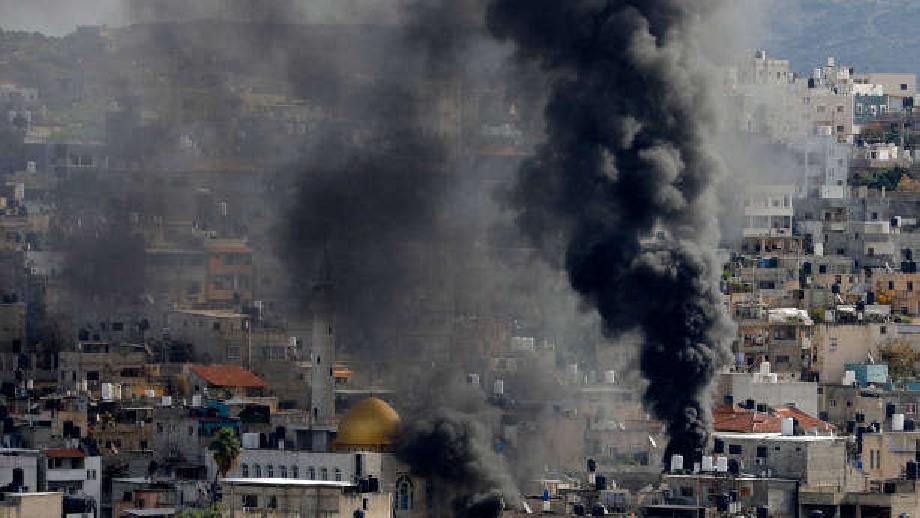
Can the Israel-Palestine War ever come to an end? Can permanent peace ever exist between these nations? Has the International Community played a role in exacerbating or de-escalating the war? What is the stance of Africa and her giant in the ongoing war?
This article attempts to answer these questions that ravage the mind of individuals consuming news updates about the ‘Jewish-Arab war’. But first, a little history:
How the War Began
The Israel-Palestine war, which is one of the world’s longest-running conflicts, claiming thousands of lives, can be traced back to World War I when Britain defeated the Ottoman Empire and took control of the area known today as Palestine. An Arab majority and Jewish minority thereafter occupied the land leading to friction between the two peoples.
The BBC reports that an escalation of the already existing friction was brought about by the 1917 Balfour Declaration issued by the British Foreign Secretary at the time, Sir Arthur James Balfour, and endorsed by the League of Nations. The declaration can be said to be a result of sustained efforts by the Zionist Organization to establish a Jewish State in Palestine. According to the United Nations, the Balfour Declaration read:
I have much pleasure in conveying to you on behalf of His Majesty’s Government the following declaration of sympathy with Jewish Zionist aspirations, which has been submitted to and approved by the Cabinet:
“His Majesty’s Government view with favour the establishment in Palestine of a national home for the Jewish people, and will use their best endeavors to facilitate the achievement of this object, it being clearly understood that nothing shall be done which may prejudice the civil and religious rights of existing non-Jewish communities in Palestine or the rights and political status enjoyed by Jews in any other country."
I would be grateful if you would bring this declaration to the knowledge of the Zionist Federation.
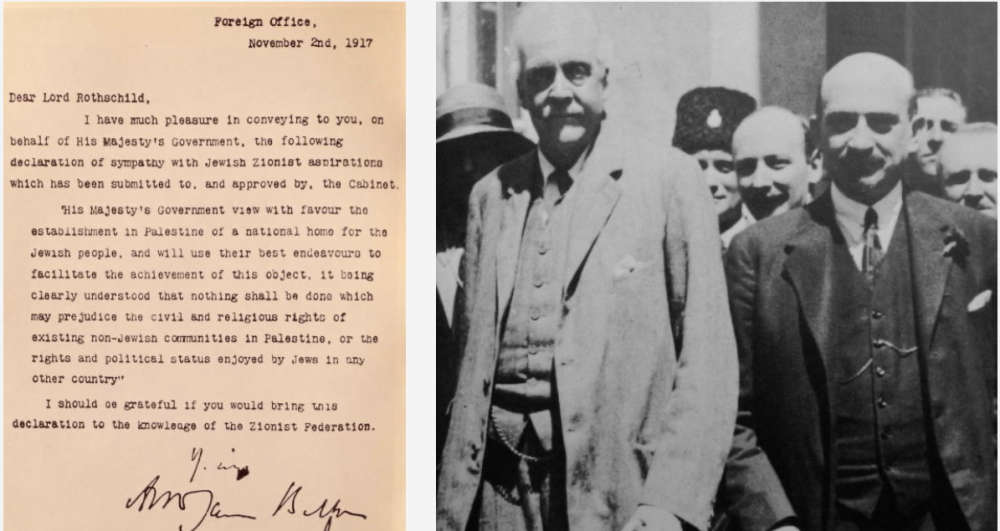
Universal History Archive/Universal Images Group via Getty Images: A copy of the Balfour Declaration alongside Dr. Chaim Weizmann with Lord Balfour, visiting Jerusalem in Palestine (later Israel) 1925.
Safe to say, the 1917 Balfour Declaration and the 1923 British Mandate emboldened the Zionist Movement to push the boundaries of their land further by seizing areas inhabited by the Arab majority with Britain supporting the mass Jewish immigration where many of the new residents were fleeing the Nazi Holocaust in Europe in World War II. Their country’s changing demographics and British confiscation of their lands only for it to be given to Jewish settlers intensely agitated the Palestinians.
The 1920s to the 1940s saw an increase in violence between Jews and Arabs, and against British rule, as multiple pockets of violence erupted from the above-mentioned activities. Some of such were the ‘Arab Revolt’ which lasted from 1936 to 1939 and the Jewish Catastrophe popularly known as the ‘Nakba’ by the Palestinians from 1947 to 1949. According to Aljazeera, this era initiated the creation and growth of the Haganah, the Jewish paramilitary which later became the core of the Israeli army.
With thousands of Palestinian lives lost, wounded, and imprisoned, an increasing Jewish population in Palestine, and Britain’s inability to quell the violent eruptions, the United Nations adopted Resolution 181, which called for the partition of Palestine into Arab and Jewish states with Jerusalem becoming an international city. Aljazeera also reports that this move was vehemently rejected by the Arabs as it allotted about 55 percent of Palestine to the Jewish state, including most of the fertile coastal region.
On 15 May 1948, Jewish leaders declared the creation of the State of Israel on the back of Resolution 181 adopted by the UN in 1947, while anticipating being admitted as a full member state by the global body. This eventually happened in 1949. The BBC reports that the day after Israel announced itself a state, five Arab countries attacked Israel, hallmarking the first Arab-Israeli war where fighting ended in January 1949 after an armistice between Israel, Egypt, Lebanon, Jordan, and Syria where Israel controlled most of the territory. Jordan occupied land which became known as the West Bank, and Egypt occupied Gaza while Jerusalem was divided between Israeli forces in the West, and Jordanian forces in the East.
As there was never a peace agreement, more wars occurred in the following decades, especially the 1967 war that brought about Israel’s occupation of East Jerusalem and the West Bank, including most of the Syrian Golan Heights, Gaza, and the Egyptian Sinai peninsula.
Today, Palestinian refugees and their descendants live in Gaza and the West Bank, as well as in neighboring Jordan, Syria, and Lebanon. Israel still occupies the West Bank and claims the whole of Jerusalem as its capital, while the Palestinians claim East Jerusalem as the capital of a hoped-for future Palestinian state.
Although there have been calls by the UN for the right of return for Palestinian refugees, Israel has not allowed them or their descendants, stating that it would be a threat to its existence as a Jewish state.
An in-depth look at the history of the war and all its antecedents poses multiple questions:
What should happen to an estimated six million Palestinian refugees scattered across three countries, the West Bank and the besieged Gaza Strip? Should the Jewish settlements built in the West Bank stay or be removed? Should the two sides share Jerusalem? Is it time for a Palestine State to be created alongside Israel?
The International Community's Role in the War
Even though multiple attempts have been made by the international community to quell the war, it seems to be never-ending.
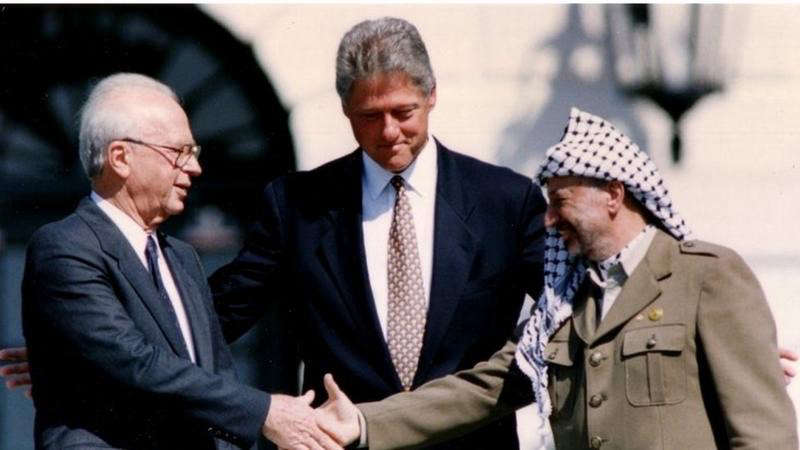
Peace seemed possible in the early 1990s when the Oslo Accords were signed (Reuters)
The call by the United Nations for a two-state solution is one such proposition. The 1993 Oslo Peace Accord that came after the first intifada and a series of secret talks in Norway is another one. Where, for a short while, the Palestinians recognized the State of Israel, and Israel in turn recognized the Palestine Liberation Organization (PLO), as the sole representative of the Palestinian people, and a self-governing Palestinian Authority (PA) was set up. This, Palestine did, based on a two-state solution as the PA was supposed to precede the first elected Palestinian government running an independent state in the West Bank and Gaza Strip with its capital in East Jerusalem, but it did not happen.
Instead, multiple bouts of violence have continued to occur especially in Gaza between Israel and recently elected Hamas, the most recent being the war that started on 7 October 2023 where CNN reports that an estimated 30,000 people have been killed, with over 70,000 injured in Gaza according to figures from Gaza’s Healthy Ministry.
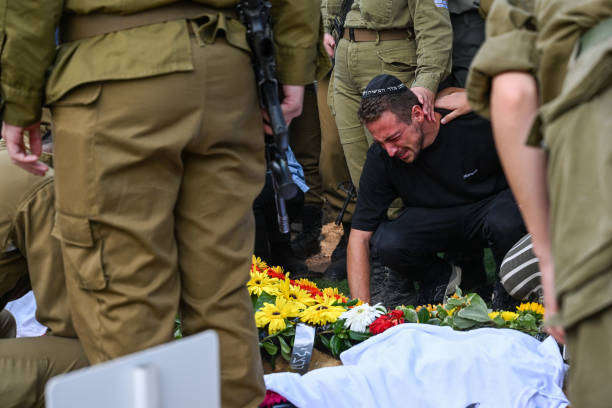
JERUSALEM, ISRAEL - OCTOBER 12: Family and friends of Valentin (Eli) Ghnassia, 23, who was killed in a battle with Palestinian militants at Kibbutz Beeeri, near the Israeli border with the Gaza Strip, cry at his grave during his funeral. (Getty Images)
A recent interview with the Minister of Social Development, Hamas Government of Gaza, Dr. Ghazi Hamad, and Israeli Ambassador to Nigeria, Michael Freeman about the Palestine-Israel conflict on Nigeria Info FM’s program, Borderlines, proves that the divide continues to thicken despite multiple efforts to quell the war. Dr. Ghazi Hamad accused Israel of never wanting any form of peace and cooperation.
“We’ve never had any kind of cooperation. For more than 40 to 50 years, we never recognized the right of Israel. There is no kind of harmony between Israel and Hamas. We consider Israel as our enemy. They are fighting against our identity, our culture, and our future. We want to put an end to the occupation. Israel is a state of occupation. We have never seen one positive signal since 1914 till now that Israel wants peace,” he said.
The Israeli Ambassador to Nigeria debunked these claims.
“Dr. Ghazi Hamad lied when he said Israel is not interested in peace. This is evident in the offer made in the year 2000 at Camp David, the offer made in 2008 by former Israeli PM, Ehud Olmert, and the withdrawal from Gaza in 2005. He, clearly, thinks Israel has no right to exist. The Hamas Charter says clearly they want to destroy Israel and kill the Jews,” he argued.
Africa and Nigeria's Stance in the War
As the death toll from the war grows, African governments have gotten into heated debates about the conflict, with the continent deeply divided as different nations take opposing sides while some remain neutral all based on their political, economic, religious, and geopolitical interests.
In the immediate aftermath of the attack by Hamas in October 2023, The Republic records that Kenya, the Democratic Republic of Congo, Ghana, South Sudan, Zambia, Togo, Cameroon, Malawi, Gabon, and Madagascar sympathized with Israel and condemned Hamas. Rwanda also sympathized with Israel but provided humanitarian aid to Gaza in late October. On the other hand, several of Africa’s Arab League members - Algeria, Tunisia, Libya, Mauritania, and Djibouti have apportioned the blame for the conflict on Israel. South Africa was one of the few non-Arab League members in Africa to, clearly, condemn Israel, blaming her for igniting anger among Palestinians, saying the continual violations had radicalized Hamas.
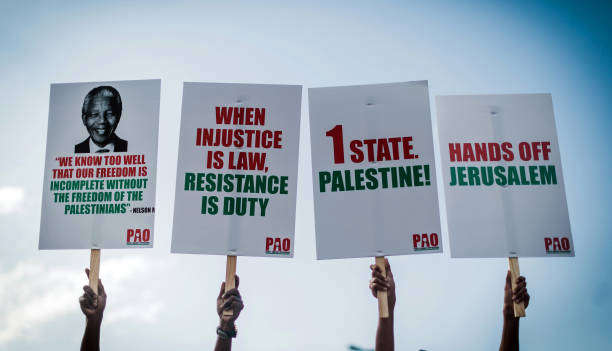
RAJESH JANTILAL/AFP via Getty Images: People hold placards during a demonstration by pro-Palestinian groups and other civil society organizations, in Durban on June 2, 2018, to protest against the killing of Palestinians by Israeli forces in Gaza.
Also critical of Israel was the African Union and its chairman, the Chadian Moussa Faki Mahamat, who accused Israel of ‘war crimes’ and the denial of the fundamental rights of Palestine to exist as a state side-by-side with Israel. The rest of the continent has remained neutral, either calling for de-escalation or going completely silent. Some of the neutral states include countries with strong bilateral ties with Israel, such as Ethiopia, Uganda, Tanzania, and Angola.
Meanwhile, Nigeria, the giant of Africa has called for a ceasefire in the ongoing war, highlighting its stance - a two-state solution to resolving the age-long crisis. Punch Newspaper gives an account of a recent meeting between the Palestinian Ambassador to Nigeria, Abdallah Shawesh, and Nigeria’s Minister of Foreign Affairs, Yusuf Tuggar, where Nigeria’s stand on the ongoing conflict was emphasized.
“I reiterated to him Nigeria’s position which is for a two-state solution and we are totally against wanton and indiscriminate violence against civilians. It doesn’t matter who is carrying the violence out, Nigeria stands against that and with regards to the current situation in Gaza, Nigeria voted in favor of a cessation of hostilities. That is our position and it will remain so.”
So, What's the Takeaway?
Two wrongs don’t make a right. The constant need to revert to the past to fuel the fires of the future and create more havoc should stop. It is expedient to move on as the deed has already been done on both sides. History ought to be a place of learning and not to repeat the same mistake.
With the International Court of Justice calling the recent war a plausible genocide of the Palestinian people, the international community’s need to intensify de-escalation and peace efforts is evident and expedient to find a long-lasting solution.
Sincerity from both parties and their perceived sponsors would be appreciated as efforts for peace are being made, as this would foster trust in keeping to agreed terms on both sides while building confidence in one another to reasonably co-exist as two states.
As it stands, only time will answer the pertinent question - Will the Israel-Palestine war ever come to an end?


